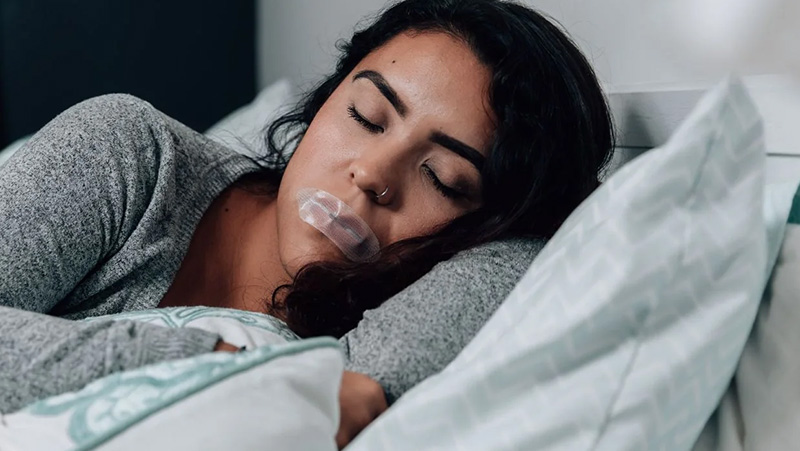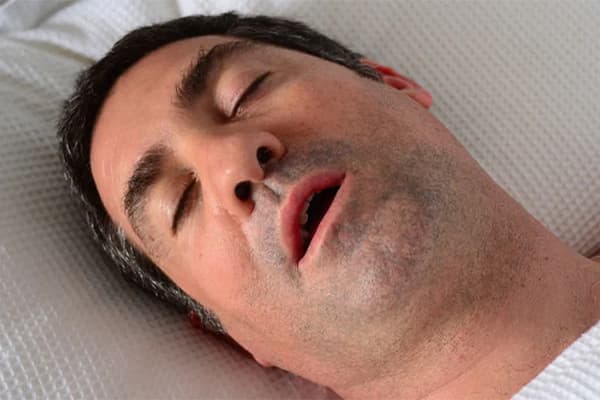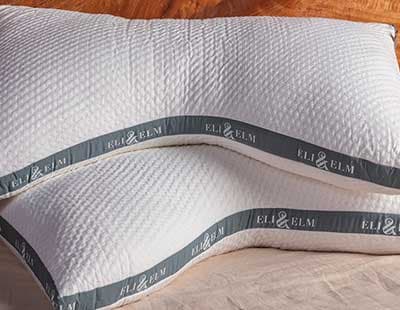We all know the importance of breathing– it gives our body what’s required, i.e., the oxygen it needs to stay alive, and helps eliminate unnecessary substances like carbon dioxide and waste. Now, there are two passages for the air to enter your lungs: your nose and mouth. Most of us just naturally breathe through our noses without thinking much about it. It's like an inbuilt quality of our bodies that ensures we can breathe even while eating without getting choked.
But some people start mouth breathing mostly while sleeping, or they're born that way. In both cases, breathing through the mouth normally happens without notice. However, this might lead to some serious health issues if neglected.
How to Identify If You Are Mouth Breathing?
Sometimes it's difficult to figure out if you're a mouth-breather, especially if it happens when you're sleeping.
Here are some signs and symptoms that you are sleeping with your mouth open:
- Waking up with a dry mouth
- Snoring during sleep
- Runny nose
- Morning breath
- Having sore throat
- Sounding hoarse
- Feeling a bit foggy in the brain
- Waking up tired and cranky
If you can relate to these signs, it's advisable to get in touch with a medical professional. Your doctor can help you figure out if you're mouth breathing or not.
The Risk of Sleeping With Your Mouth Open
Let's have a look at the health issues related to breathing through your mouth all the time. Surprisingly, a lot of people deal with this, so if you are worried about being alone then remember you are not!
First things first, there's a difference between occasionally mouth breathing (like when you have a cold or cough) and doing it all the time. If it's just now and then, no big deal. But if it's happening a lot, there might be something going on that needs checking.
Now, if you're a chronic mouth breather, meaning you do it more often like maybe regularly, the possibilities are it might result in some health issues. Here are a few of them:
- Dental troubles: Breathing through your mouth can dry it out, and that's not good for your teeth. It might lead to problems like cavities, gum problems, and loss of the enamel.
- Yeast infections: There's this yeast called Candida that hangs out in your nose and mouth. When your mouth gets super dry from all that breathing, it can cause too much bacteria and lead to infections. You might notice white blotches on your mouth, tongue, and throat – that's called Thrush.
- Really dry mouth: If your mouth gets extremely dry from all the breathing, you might deal with bad breath, trouble chewing and swallowing, or even cracked lips.
So, if you're dealing with chronic mouth breathing, it's always better to have a chat with your healthcare provider. They can help you figure out ways to make things better.
ELI&ELM SPECIAL OFFER!
The Advantages of Breathing Through Your Nose
We usually don't think much about breathing through our noses until we catch a bad cold. It can be extremely annoying especially when we try to sleep. But did you know your nose makes something called nitric oxide, which acts as an antidote for your body?
Here are a few more surprising facts or rather advantages of breathing through your nose.
- Helps you breathe better: Nitric oxide makes it easier for your lungs to grab oxygen and spread it all over the body. It also helps your blood vessels to open up.
- Fights off germs: Nitric oxide is like a shield against germs and viruses. It helps your immune system fight off infections and protect your body.
- Filters the air: Your nose grabs tiny particles in the air while you breathe, like pollen, so they don't go into your lungs.
- Adds moisture: Breathing through your nose keeps the moisture in the air intact which keeps your lungs and tubes from getting dry.
- Warms up the air: Before the air gets to your lungs, your nose makes sure it's healthy and warm.
- Makes you healthier: Breathing through your nose helps your lungs to take in more oxygen and work better.
Leading Causes of Mouth Breathing
When you breathe through your mouth instead of your nose, it's often because something is blocking the airway of your nose. It's like a detour – if the nose is closed, the body automatically inhales through the mouth.
Now, there are a bunch of reasons why your nose might be blocked, like—
- allergies
- a cold
- a sinus infection
- big adenoids or tonsils
- a crooked middle part of your nose (septum)
How to Stop Sleeping With Your Mouth Open

If you want to quit the habit of mouth breathing, the first step is to figure out why it's happening. Treating the root cause can help you achieve it! For instance, things like humidifiers or nose sprays might help if you have a stuffy nose that is making you breathe through your mouth. But things like allergies, asthma, or sinus infections need to be treated first as in these cases a nose spray might not work.
Now, here are some tricks to help you stop sleeping with your mouth open.
Nasal Strips:
If you're having trouble breathing through your nose, nasal strips might be a life-savior. These are sticky strips that go on the bridge of your nose and use springs to widen your nostrils. Some studies say they reduce stuffiness and make sleep better, but not everyone agrees.
Mouth Taping:
Some experts suggest mouth taping as a way to get you breathing through your nose and stop snoring. This means taping your mouth shut or putting a soft patch on it at night. A small study found that people who tried this reported less daytime sleepiness, less snoring, and fewer interruptions while sleeping.
Sleeping Position:
Changing your sleep position can also help you clear your nose and prevent mouth breathing. People struggling with sleep apnea should try sleeping upright or on their side for a better night’s sleep. Special backpacks, cooling pillows by Eli & Elm, or even attaching tennis balls to your back can help you stay in the right position.
Surgery:
The thought of getting surgery for mouth breathing might make you a little nervous. However, certain surgical procedures are quite helpful and safe for both children and adults. One common procedure that is generally performed on children is adenoidectomy, where the doctors remove swollen adenoids during the surgery.
Another treatment when breathing becomes difficult due to nasal polyps and growths in the nose, doctors might prescribe a special nasal spray to deal with them, but if that doesn't work, experts recommend endoscopic surgery, to remove the nasal polyps that further helps improve breathing.
When to See a Doctor
If in case you notice the following symptoms in children look for medical help right away—
- breathing through their mouth,
- snores,
- headaches,
- trouble concentrating, or
- wetting the bed more frequently.
These might be a symptom of severe sleep apnea. Moreover, if you notice your children struggling to breathe, call your healthcare professional immediately. They can help find out what is the root cause to make things better.
Also, for some people who are dealing with serious health issues like trouble gulping or swallowing, speaking, and suffering from mouth pain, talking to a doctor or dentist might be helpful.
Stop Sleeping With Your Mouth Open with Eli & Elm
Your sleep is super important for your health as well as for us. Remember, Rome wasn't built in a day, and breaking the habit of sleeping with your mouth open might take some time. Be patient with yourself.
Eli & Elm is here to help you make your way to quieter, more refreshing nights of sleep with our highly recommended and comfortable pillows for every sleeping position, especially if you're dealing with mouth breathing issues.
Sources:
Sleep Foundation: Is Sleeping With Your Mouth Open Bad?





















